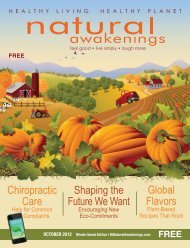STRAIGHTEN UP - Natural Awakenings
STRAIGHTEN UP - Natural Awakenings
STRAIGHTEN UP - Natural Awakenings
Create successful ePaper yourself
Turn your PDF publications into a flip-book with our unique Google optimized e-Paper software.
consciouseating<br />
liQuiD<br />
nutRition<br />
Water Myths<br />
and truths<br />
by Catherine guthrie<br />
For the past 50 years, nutritionists<br />
and other health experts have<br />
been exhorting Americans to<br />
drink more water. If the ubiquity of<br />
water bottles is anything to go by,<br />
the message has been received loud<br />
and clear. But now, updated research<br />
lets us off the hook. It turns out that<br />
much of the water craze springs from<br />
a deep well of misinformation. Our<br />
experts debunk some of the most<br />
popular water myths.<br />
MYTH: You need eight, eight-ounce<br />
glasses of water a day to be healthy.<br />
TRUTH: The familiar eight-by-eight<br />
rule is likely based on misinterpretation,<br />
rather than scientific certainty,<br />
says Dr. Heinz Valtin, a kidney specialist, textbook author<br />
and retired professor at Dartmouth Medical School, in<br />
Hanover, New Hampshire. Valtin traces the prescription to<br />
a 1945 recommendation by the Food and Nutrition Board<br />
of the National Research Council to take in, “1 milliliter for<br />
each calorie of food.”<br />
In a study published in the American Journal of Physiology<br />
in 2002, Valtin explains that most of that allotment already<br />
comes from the foods we eat. He not only discredits the need<br />
for most people to consume this “mythical” amount of water<br />
every day, but writes that the recommendation is potentially<br />
harmful, by making people feel guilty for not drinking<br />
enough.<br />
“The consumer ended up thinking only plain water<br />
counts,” says Ann Grandjean, Ph.D., a hydration researcher<br />
and medical nutritionist with the University of Nebraska<br />
Medical Center, in Omaha. But almost all liquids—including<br />
tea, coffee and beer—count toward the daily water intake,<br />
she says.<br />
So, how much should you be drinking? Researchers at<br />
the National Academy of Sciences’ Institute of Medicine,<br />
after reviewing more than 400 studies, including Valtin’s, set<br />
the general daily intake for women and men at about 91 and<br />
125 ounces, respectively. The average American receives 20<br />
34 Chicago North & North Shore www.NAChicagoNorth.com<br />
percent of this daily water intake from food. The remaining<br />
80 percent comes from all beverages—not just water.<br />
MYTH: Caffeinated beverages zap the body’s water reserves.<br />
TRUTH: Grandjean first became interested in the reputed<br />
link between dehydration and caffeine while working as<br />
a consultant to the United States Olympic Committee. “I<br />
worked with elite athletes, and I noticed they drank a lot of<br />
caffeinated beverages without showing any sign of dehydration,”<br />
she says. In 2000, she published a study in the Journal<br />
of the American College of Nutrition showing that the body<br />
doesn’t discriminate between regular and decaf beverages<br />
when it comes to hydration.<br />
MYTH: If you’re thirsty, you’re already dehydrated.<br />
TRUTH: While thirst is an accurate barometer of when to<br />
imbibe, the notion that thirst signals a dehydrated body is not<br />
true, says Valtin. Thirst is triggered when the blood’s concentration<br />
of solid particles rises by 2 percent. Dehydration<br />
occurs when the blood concentration rises by 5 percent. So,<br />
thirst sets in before dehydration and people who shrug off<br />
their thirst can find themselves on the path to dehydration.<br />
“Thirst is the first indicator of the body’s need for water,”<br />
cautions Dee Sandquist, a spokesperson for the American Dietetic<br />
Association. Signs to watch out for include headache,<br />
dry mouth, rapid pulse and lightheadedness.<br />
MYTH: Urine should be clear.<br />
TRUTH: Perpetually clear urine can actually be a sign of<br />
drinking too much water, which can dilute the body’s electrolytes,<br />
according to Grandjean. “Healthy urine should have<br />
some color,” she counsels. Certain vitamins, such as riboflavin<br />
(B ), can darken urine.<br />
2<br />
MYTH: Drinking a lot of water suppresses the appetite.<br />
TRUTH: While being adequately hydrated helps the metabolism<br />
run at its optimal level, drinking vast quantities of water<br />
won’t affect the overall amount of food you eat. Because<br />
water quickly empties from the stomach, drinking water has<br />
little effect on appetite, says Barbara Rolls, director of the<br />
Laboratory for the Study of Human Ingestive Behavior, at<br />
Pennsylvania State University. Eating foods that have a high<br />
water content, such as fruits, vegetables, soups and grains,<br />
can help us to feel sated.<br />
MYTH: Bottled water is always better than tap water.<br />
TRUTH: Not necessarily. Be aware that bottled water is often<br />
just tap water. A <strong>Natural</strong> Resources Defense Council report<br />
cites government and industry findings that 25 percent of<br />
bottled water is plain tap water; sometimes treated, sometimes<br />
not. NSF International certification indicates brands<br />
that meet federal safety standards.<br />
Catherine Guthrie is an award-winning health and lifestyles<br />
journalist in Bloomington, IN. Connect at CatherineGuthrie.com.





